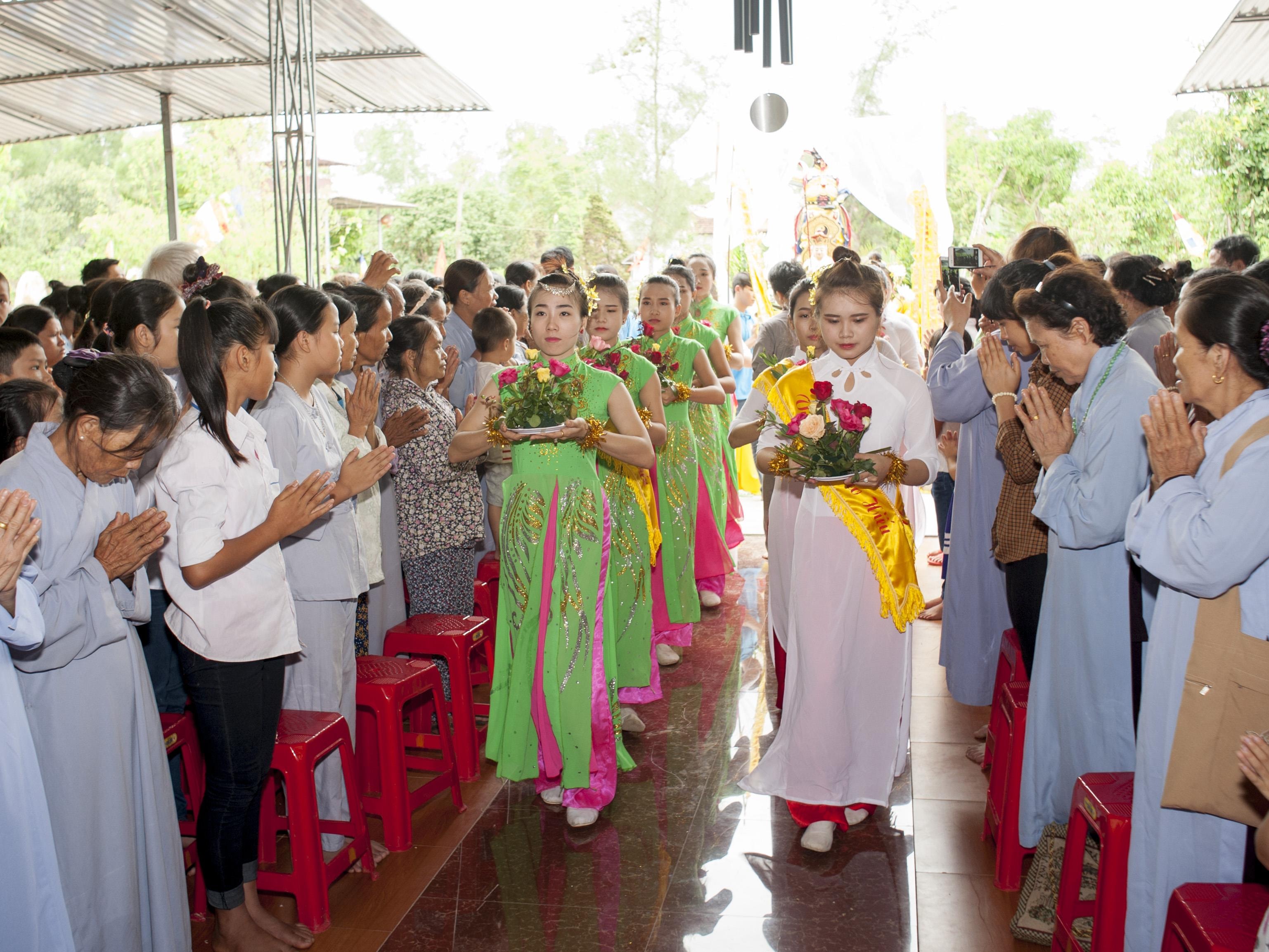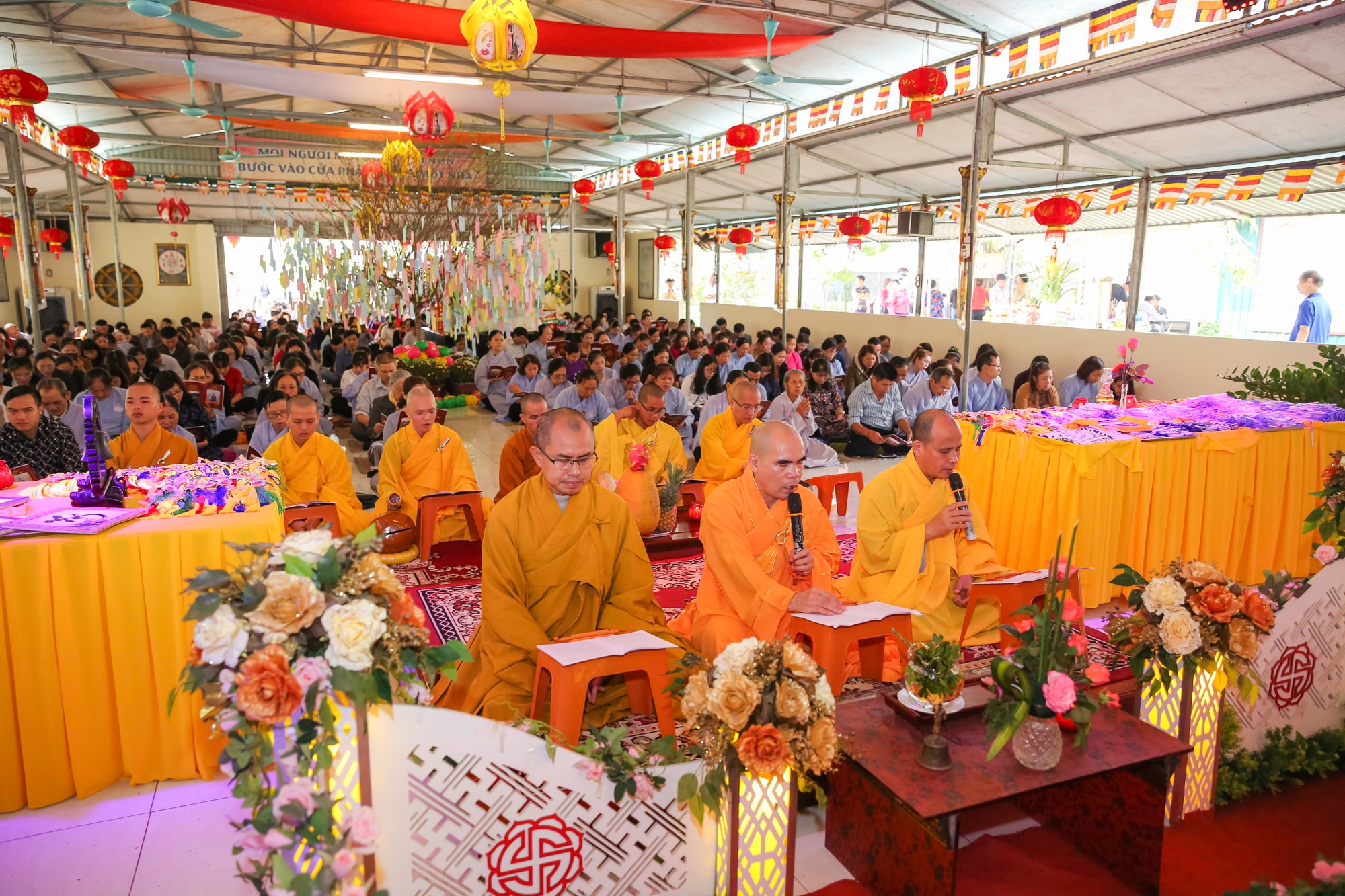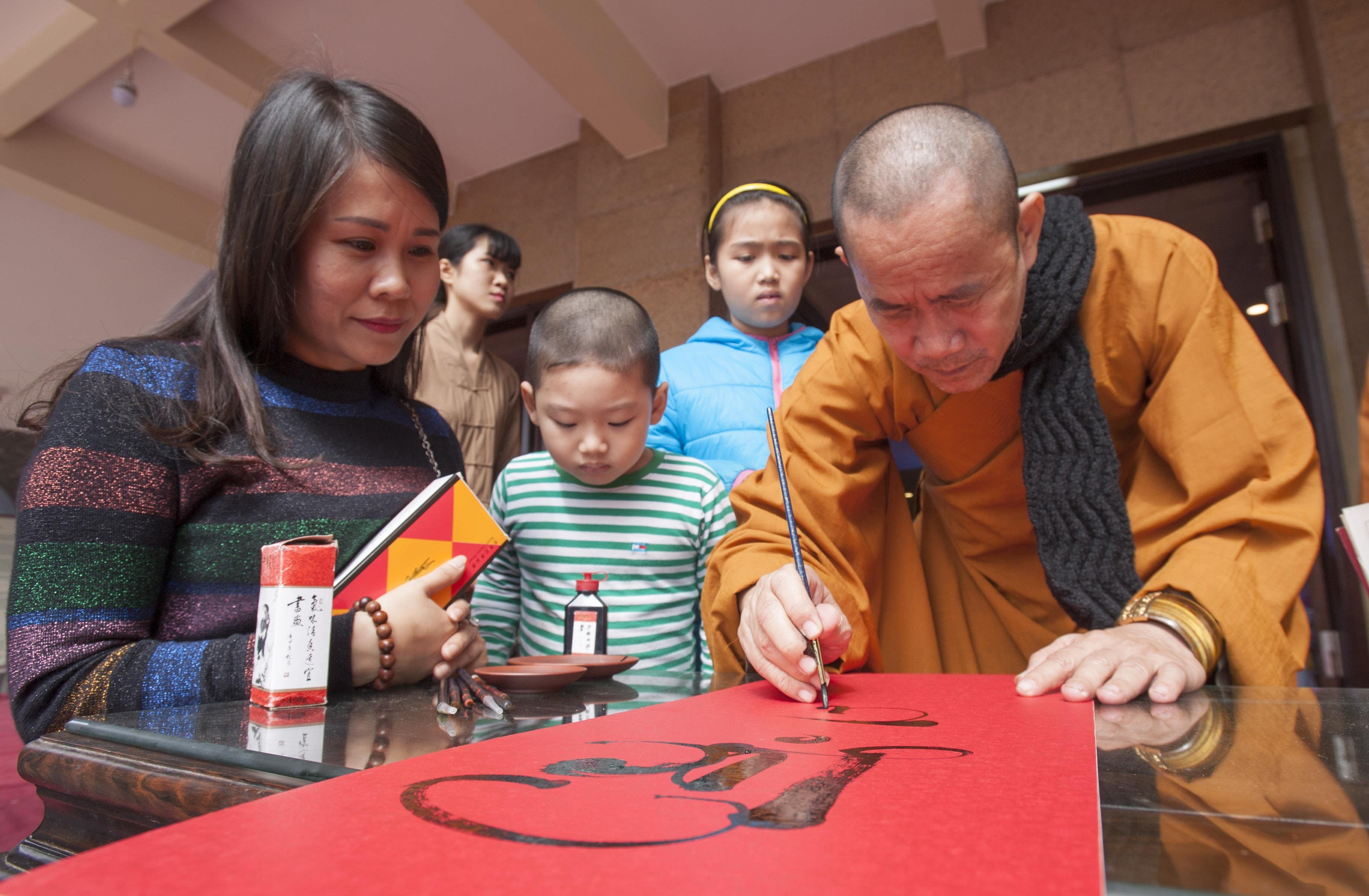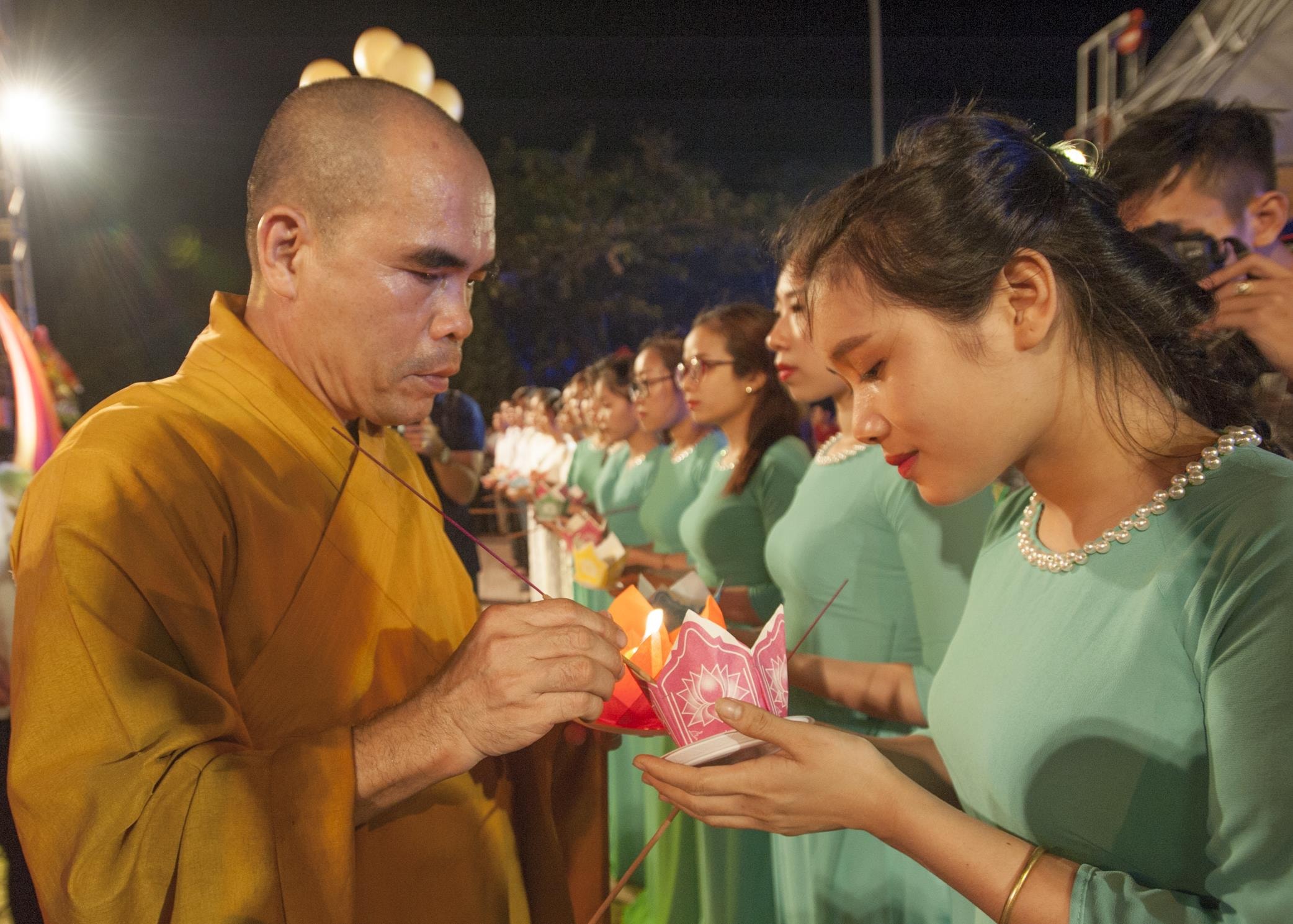Women's need to come to Buddhism
(Baonghean) - In Vietnamese culture, pagodas are always a familiar place for women. Women choose to go to pagodas to meet their psychological, spiritual and mental needs, both to reduce and avoid hardships, losses and disadvantages in daily life, and to find a place to share with friends and Buddhists.
Go to the temple for peace of mind
That is why it is easy to see that in groups of people going to pagodas, whether on holidays, Tet or normal days, women still make up the majority.
According to a preliminary statistic in the press, Nghe An currently has 55 large pagodas that are cared for by the Buddhist Sangha and have a decision to be managed by a monk, attracting more than 50 thousand Buddhists to regularly go to the temple. This number is probably still modest, because besides that, there are tens of thousands of people who still go to the temple but they do not consider themselves Buddhists. Women account for an overwhelming proportion of people who go to the temple. Especially, in areas with many ancient pagodas, which are places where Buddhism has developed for a long time such as Vinh City, Dien Chau, Yen Thanh, Quynh Luu, Do Luong, ... the number of women going to the temple is even higher.
In many areas in Yen Thanh, Dien Chau, Quynh Luu and Vinh City, many women also gather in groups of friends to go to the pagoda, not only regularly going to the pagoda near their home to worship Buddha, but also organizing car rentals at the beginning of the year for the whole group to go on pilgrimages to many different pagodas.
“Going to the temple is very good, especially for women who are quite old. After many years of hard work taking care of their families, now they need to rest, go to the temple to relax, feel comfortable, not angry, or grumpy with their children and grandchildren. My friends and I in the group of friends who go to the temple often participate in charity work with the temple, read Buddhist scriptures to pray for peace for the whole family. Or sometimes, simply going to the temple makes us feel peaceful, relieved, avoid the hustle and bustle of life, also avoid many diseases, avoid accidents...”.
 |
| Vu Lan ceremony at a pagoda attracts many female Buddhists. Photo: Thanh Cuong |
In a small survey of 116 women aged 16 to 70 living in Vinh City and Yen Thanh District, 98 people went to the pagoda in January (accounting for more than 84%), of which 67 people regularly went to the pagoda, the rest only went to the pagoda 1-4 times a year. In terms of occupation, those who work in trading and self-employment go to the pagoda the most, followed by state officials (both working and retired) and then others.
In terms of purpose, most people go to the temple to pray for peace and happiness for their family, some also pray for wealth and fortune, some just go to the temple to sightsee. The common point is that most people go in groups. Many elderly people often choose to go to the temple near their home and go more often.
"You should go to the temple to feel at peace. Now that you can't do heavy work anymore, you should go to the temple to feel more comfortable, and pray for Buddha to bless and protect your children and family to be safe and happy. Especially in January, you should go to the temple to worship Buddha, praying for your family to be safe and sound all year round."
Mrs. Khanh, 69 years old in Vinh city
Of course, nowadays, going to the pagoda is not only a habit of the elderly. Many young women also choose to go to the pagoda in the early spring.
“Going to the temple makes me feel more comfortable. All year round, I do business, run around everywhere, compete with food and clothing, with work, sometimes I gain, sometimes I lose, but I always have to worry. Only when I go to the temple do I feel more relieved. So I still go to the temple every month. In January, I go to most of the temples in the province that I know, to pray for a lucky and happy year for the whole family.”
Giang, a 21-year-old girl, during a ceremony at Chi Linh Pagoda (Yen Thanh)
Towards truth, goodness, and beauty
Regarding the role of women, when coming to the temple, women have the opportunity to more fully express their female role in society according to the Buddhist principle of "Accumulating Goodness". That is, they have the opportunity to express love, protection, and spiritual support for family members.
Furthermore, they can participate in charity work for the society that the temple (represents) organizes (such as helping the temple on the first and fifteenth days or the death anniversary of the founder...), participating in spreading the benefits of vegetarianism, distributing charity porridge at hospitals, visiting and helping poor students and people in disaster-stricken areas... This helps women feel that they have a more positive role in their family and society.
 |
| Peace praying ceremony at Duc Hau Pagoda, Vinh City. Photo: Duc Anh |
It can be said that Buddhism teaches women to show a positive role (good nature) but does not teach them to demand anything from society and family, so when they come to the temple, they are almost never opposed or shamed... It is peaceful when they are still themselves, and both family and society accept what they do at the temple as good and kind!
Economically, women find it easier to find a community that shares their economic resources: when they are in need, the temple is ready to take care of them and share, whether it is a vegetarian meal or helping out in the temple. When they earn little, they voluntarily and freely contribute a little "lamp oil" to the temple, or can contribute to making temple bells, repairing temple gates, fixing leaky temple roofs, etc. without any mandatory regulations.
Explaining the reason why temples and Buddhism have become closer to women, Dr. Dang Hoang Giang (Hanoi University of Social Sciences and Humanities) said: Women have always belonged to a disadvantaged group in society and are generally vulnerable and suffer many disadvantages, so they always need religion to protect their spiritual life, their family and their loved ones. Before 1945, communal houses were naturally a place exclusively for men, while temples were a space for women. Women have been close to temples for a long time and temples are also more feminine than other sacred spaces. Moreover, due to psychological characteristics, women tend to observe and feel life through emotions, so women are more sympathetic to Buddhism. In Vietnam today, many women become nuns and preach about Buddhism. Technology has brought their voices to more women, attracting more participants.
 |
| Asking for the first calligraphy of the year at temples and pagodas attracts many participants. Photo by Thanh Cuong |
Meanwhile, with a deeper perspective, Associate Professor Dr. Hoang Thi Tho (former Head of the Department of Buddhist Philosophy, Institute of Philosophy, Vietnam Academy of Social Sciences) analyzed more clearly on many aspects. In terms of psychology and spirituality, women appear to be more sensitive, weak, and vulnerable than men...; they often listen to whatever anyone says, or follow trends, even when they do not understand anything. For example, when they do not have their own family, still living with their parents, girls often follow their mothers and grandmothers to the temple more than boys. When they grow up a little, go to school and when they are entangled in private love affairs at a young age, there is almost no special advice, so they also follow their friends to the temple to pray and beg for help in studying and praying for love. This is a psychological aspect of adolescents that is left blank by family, school and society, they have to figure it out on their own.
Coming to a good temple is a blessing because in Buddhist teachings there is also some guidance on mastering the mind and analyzing the origin of all suffering as Ignorance (ignorance) which gives rise to greed, anger, and delusion, thus bringing suffering upon oneself... However, when coming to the temple, many women follow Buddhism and become monks... when they see that going there can hide (not necessarily solve) the deadlocks of life.
 |
| Candle lighting ceremony to commemorate War Invalids and Martyrs Day, July 27. Photo: Thanh Cuong |
In terms of art, Buddhism focuses on the inner self, so literature, painting and architecture all seem to be not noisy, but nostalgic, sharing contemplation, so when women come to Buddhism, they can easily share and even experience it themselves.
Especially in village festivals, which are often associated with the village cultural center, the Communal House and the Pagoda. Many folk art activities are added to the content and art forms of the festival (cooking, cuisine, specialties, craft villages... folk songs...) and the participation of young women as well as older female artists is very necessary.
Thus, women going to pagodas at the beginning of the year is an activity that they aim for many values. In addition to praying for blessings and peace for their families, they also want to affirm their own values, to experience objectively life as well as their inner life.
In short, the increasing number of women going to pagodas today is a sign of returning to the roots of Buddhist culture, because women have a long-standing relationship with Buddhism in history. In the context of increasingly complex modern society, people have to face many risks, so going to pagodas helps people relieve their anxiety, so the trend of going to pagodas will probably increase in the near future.


